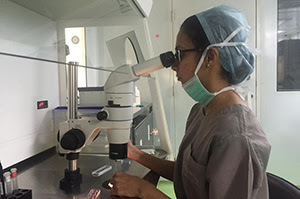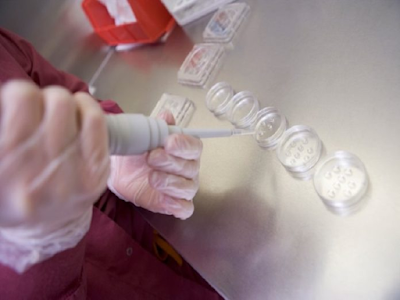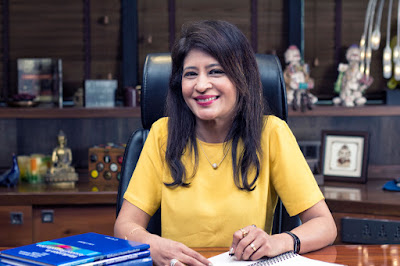'Egg freezing’ or ‘assisted reproduction were not prominent in India but with the advancements in the IVF, these processes are the future of parenthood and infertility treatment. There is a change in the dynamics with cryopreservation of egg cells that support women and their life choices. Now, assisted reproduction techniques (ARTs) are gradually gaining more acceptance.
As women start aging, they face different hormonal changes, one of the constant ones being, menopause. Another change that is witnessed in women is as they age, the production of eggs decreases and the eggs produced are less healthy. Due to the poor quality of eggs, miscarriages become inevitable. Different reports and studies have revealed that miscarriage rates can soar as high as 90% in women over 40.
Many women are completing their educations, putting their careers on priority and waiting for the correct time to enter into motherhood. Goral Gandhi, a leading IVF expert, says,
“A woman’s biological clock ticks with age. It is a well-known fact. Trying for parenthood at a later age might result in difficulty during the process of conceiving and complications during birth.”
If the maternal age is more than 35, then the chances of miscarriages and abnormalities increases. Discussing the risks of abnormalities Goral Gandhi says,
As women start aging, they face different hormonal changes, one of the constant ones being, menopause. Another change that is witnessed in women is as they age, the production of eggs decreases and the eggs produced are less healthy. Due to the poor quality of eggs, miscarriages become inevitable. Different reports and studies have revealed that miscarriage rates can soar as high as 90% in women over 40.
Many women are completing their educations, putting their careers on priority and waiting for the correct time to enter into motherhood. Goral Gandhi, a leading IVF expert, says,
“A woman’s biological clock ticks with age. It is a well-known fact. Trying for parenthood at a later age might result in difficulty during the process of conceiving and complications during birth.”
If the maternal age is more than 35, then the chances of miscarriages and abnormalities increases. Discussing the risks of abnormalities Goral Gandhi says,
“In some cases, late pregnancy even result in various abnormalities in the baby, after the age of 40 the risk for Down syndrome is based on the age of the mother.” In order to deal with the changing lifestyles, miscarriages and abnormalities,
“The process of oocyte cryopreservation, which is more commonly known as egg-freezing, is a great way to preserve the fertility of a woman. This empowers them by providing a choice to have their own biological child with sperm from a partner, or from a donor, whenever they desire to,” adds Dr Goral Gandhi.
ARTs like In Vitro Fertilisation (IVF) and oocyte cryopreservation, despite being different in their approach, aim for the same result. In IVF, the eggs and sperms are cultured in a laboratory to create an embryo. The developed embryos are then injected back into the uterus in order to facilitate the process of conception.
As egg freezing is gaining professional and regulatory acceptance, it is an effective and safe technique for women who wish to preserve their eggs for when they are in a better position to start a family. Egg-freezing is an effective way of delaying motherhood which is empowering. In order to achieve better results, it is preferred that a woman freezes her eggs while she is aged 32 to 36 years. While there is no upper age limit, studies reveal that the results of egg-freezing are best until the age of 38.
Expert embryologists like Goral Gandhi facilitate women who wish to delay motherhood. With the right technology, combined with the medical skills and effective counseling has transformed assisted reproduction and late pregnancy into a viable prospect.
To go ahead with the process, it is necessary to have an experienced embryologist, Goral Gandhi, a pioneer of egg freezing technology in the country, work closely with her patients studying their family history of premature ovarian failure or early menopause, which can benefit the patients.
Having trained over 300 embryologists across the globe in the technique of egg freezing, Goral Gandhi, says,
“The intent to delay conceiving a baby may vary from finding a suitable partner, advancing age, a failed marriage, focus on a career, etc. whatever may be the reason, assisted reproduction is empowering women to live their life the way they choose to, with financial savings, mental stability and preferable partner.”
“The process of oocyte cryopreservation, which is more commonly known as egg-freezing, is a great way to preserve the fertility of a woman. This empowers them by providing a choice to have their own biological child with sperm from a partner, or from a donor, whenever they desire to,” adds Dr Goral Gandhi.
ARTs like In Vitro Fertilisation (IVF) and oocyte cryopreservation, despite being different in their approach, aim for the same result. In IVF, the eggs and sperms are cultured in a laboratory to create an embryo. The developed embryos are then injected back into the uterus in order to facilitate the process of conception.
As egg freezing is gaining professional and regulatory acceptance, it is an effective and safe technique for women who wish to preserve their eggs for when they are in a better position to start a family. Egg-freezing is an effective way of delaying motherhood which is empowering. In order to achieve better results, it is preferred that a woman freezes her eggs while she is aged 32 to 36 years. While there is no upper age limit, studies reveal that the results of egg-freezing are best until the age of 38.
Expert embryologists like Goral Gandhi facilitate women who wish to delay motherhood. With the right technology, combined with the medical skills and effective counseling has transformed assisted reproduction and late pregnancy into a viable prospect.
To go ahead with the process, it is necessary to have an experienced embryologist, Goral Gandhi, a pioneer of egg freezing technology in the country, work closely with her patients studying their family history of premature ovarian failure or early menopause, which can benefit the patients.
Having trained over 300 embryologists across the globe in the technique of egg freezing, Goral Gandhi, says,
“The intent to delay conceiving a baby may vary from finding a suitable partner, advancing age, a failed marriage, focus on a career, etc. whatever may be the reason, assisted reproduction is empowering women to live their life the way they choose to, with financial savings, mental stability and preferable partner.”

















































